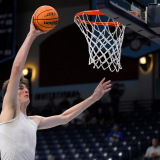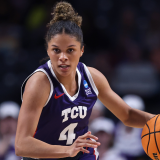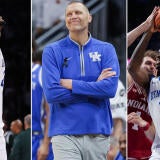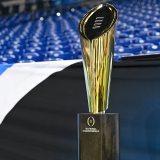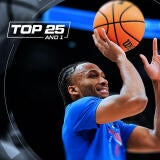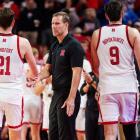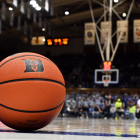Don't count out North Carolina after a comeback victory vs. UCLA that could be the spark the Tar Heels need
After trailing the Bruins by 16 points in the second half, UNC rallied for an improbable win in the CBS Sports Classic
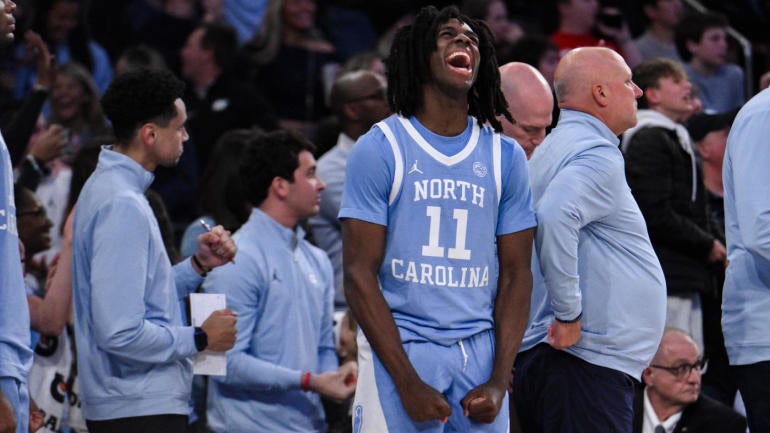
NEW YORK -- There are lots of reasons why North Carolina lost five of its first 11 games, the most obvious of which is a strength of schedule that ranks fifth nationally. But nobody cares much about the details when you're a blue-blood program that entered the season ranked ninth in the AP Top 25 poll, but entered the weekend before Christmas with a 6-5 record featuring a 0-5 mark against schools in the top 45 of the NET.
When that happens, any context sounds like an excuse. When that happens, fans typically skip the nuance and just get angry and confused and, eventually, desperate to watch their team turn things around. Here inside Madison Square Garden on Saturday, you could sense that from the North Carolina supporters who showed up in big numbers to help fill the world's most famous arena and lifted their Tar Heels to a 76-74 come-from-behind victory over No. 18 UCLA in the opening game of the 11th annual CBS Sports Classic.
"The energy here was electric," said UNC's Ian Jackson, a five-star freshman who had a team-high 24 points off the bench. "It felt like a home game, definitely."
And not just because Jackson was playing only 13 miles away from his home in The Bronx, where he graduated earlier this year from Our Saviour Lutheran High. No, it was more than that, specifically a crowd that leaned heavily toward the Tar Heels and remained engaged throughout, even when North Carolina trailed by 16 points with 12:35 remaining and seemed headed toward its sixth loss of the season.
But then RJ Davis, another local product who graduated from Archbishop Stepinac High just 27 miles from MSG, immediately countered by converting a layup to spark a 12-2 run -- and the comeback was on. Roughly six minutes later, UNC made it a one-possession game. Then it was a one-point game.
THE GARDEN IS ROCKIN!
— CBS Sports College Basketball 🏀 (@CBSSportsCBB) December 21, 2024
One-point game! pic.twitter.com/UdxR1oqw2P
But the Tar Heels didn't actually completely erase the deficit until Jalen Washington got an offensive-rebound and stick-back with 92 seconds remaining that tied the score at 72.
It was a massive moment for two reasons:
- It tied the score and electrified the crowd.
- It was a rare offensive-rebound for a program that used to excel at it but hasn't lately.
Matt Norlander and I discussed it on Friday's episode of the Eye On College Basketball Podcast, how North Carolina ranked 227th in offensive-rebounding percentage through 11 games. That's a far cry from when Roy Williams had UNC offensive-rebounding like crazy, finishing in the top five nationally in that category four straight years from 2015 to 2018. FYI: the Tar Heels ranked No. 1 in offensive-rebounding percentage in 2017 when they won the national championship, the third of Williams' Hall of Fame career.
But this season?
This season, just among schools with "Carolina" in their name, the Tar Heels rank behind East Carolina, South Carolina State, North Carolina Central, South Carolina and Coastal Carolina in offensive-rebounding percentage, according to BartTorvik.com. They've been bad at it. And, in fairness, they weren't great at it against UCLA, But with the game in the balance, and after Seth Trimble missed a 3-pointer, Washington grabbed an offensive rebound and converted the put-back to tie things with 92 seconds remaining.
UNC outscored UCLA 4-2 from that point to win. The Tar Heels finished with 25 defensive rebounds and nine on the offensive end. Both numbers surpassed what UCLA was able to accomplish on the glass.
"We out-rebounded them," said North Carolina coach Hubert Davis, now in his fourth season guiding his alma mater. "Down the stretch, we got a stop, got the rebound, made the free throws. That's something we hadn't done in past games. And so I was really proud of them."
Exactly where things go from here remains unclear -- but there's no denying Saturday provided an encouraging development, perhaps even a building block, for a team that still hasn't lost to an opponent unlikely to make the 2025 NCAA Tournament. If you're a North Carolina fan looking for reasons to be optimistic, that's the place to start, by highlighting the fact that 18 of the Tar Heels' next 20 games are against schools that are ranked lower at KenPom.com than any team that has already beaten UNC.
Duke will be a problem.
But the rest of the ACC is very manageable.
Bottom line, the worst part of the schedule is now behind North Carolina -- and there are reasons to believe the worst part of the season is also in the past. As multiple people connected to the program said Saturday, the Tar Heels "really needed this one." In dramatic fashion, they got it. And now it'll be interesting to see if a second-half comeback in The Garden four days before Christmas can be the thing that flips UNC's fate.


